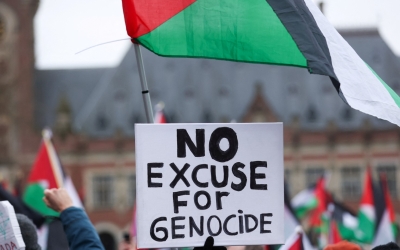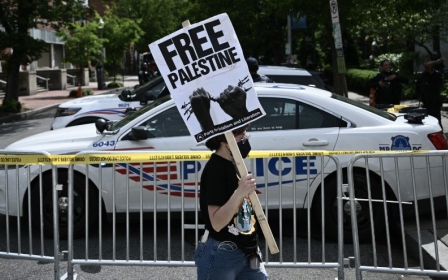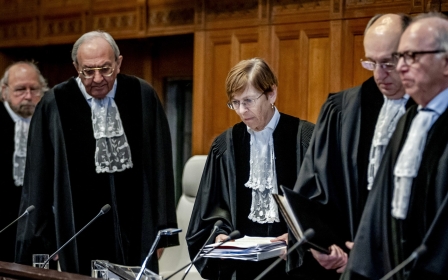The US must allow the World Court to adjudicate on Israel's genocide

Recent reports that Israel is lobbying the United States to pressure South Africa into dropping its genocide case against Israel before the International Court of Justice (ICJ) should be a wakeup call for anyone who values the rule of law.
South Africa’s case, which accuses Israel of committing genocidal acts against Palestinians in Gaza, is neither frivolous nor politically motivated. The ICJ has already ruled that there is a plausible case for Israel to protect Palestinians from potential Israeli genocide in Gaza.
Israel’s efforts to sidestep this legal scrutiny by appealing to its long-standing relationship with the US speak to a deep-rooted hypocrisy - one that Washington must reject if it is to continue presenting itself as a legitimate defender of international law.
South Africa’s decision to pursue this case reflects its own painful history of battling institutionalised racism and oppression.
South Africa, having endured the horrors of apartheid, understands the devastating consequences of state-sanctioned violence and racial discrimination. It was only through sustained international pressure - including sanctions, boycotts and moral outrage - that the apartheid regime was dismantled.
New MEE newsletter: Jerusalem Dispatch
Sign up to get the latest insights and analysis on Israel-Palestine, alongside Turkey Unpacked and other MEE newsletters
The parallels between apartheid-era South Africa and the situation in the occupied Palestinian territories are too glaring to ignore. South Africa’s decision to challenge Israel on the international stage is rooted in its moral responsibility to confront injustice wherever it occurs.
This case is not a symbolic gesture. It is a well-founded legal argument based on the principles laid out in the 1948 Convention on the Prevention and Punishment of the Crime of Genocide.
Glaring double standard
Israel’s actions in Gaza - its ongoing blockade, repeated military offensives leading to mass civilian casualties, and destruction of essential Palestinian infrastructure - create a clear pattern that warrants serious investigation.
Schools, hospitals and residential buildings have been targeted, and tens of thousands of people have been killed. The ICJ offers a forum for these facts to be weighed impartially, but Israel’s attempts to derail the case by appealing to the US reveal its discomfort with facing legal consequences.
Follow Middle East Eye's live coverage of the Israel-Palestine war
The US has a critical role to play here. Historically, Washington has often shielded Israel from global accountability by vetoing UN resolutions, providing diplomatic cover, and offering unconditional military aid. This special relationship, however, undermines the very values the US claims to champion.
For the US to pressure South Africa into abandoning its ICJ case would send a clear signal that international law is nothing more than a political tool, applied selectively when convenient, but ignored when inconvenient for the US and its allies.
American foreign policy, shaped in part by the powerful influence of pro-Israel lobbying groups, has long been marked by a glaring double standard.
The world cannot afford to let international law become meaningless at such a critical juncture
While the US invokes international law to condemn its adversaries - whether in Iran, Russia, North Korea or elsewhere - it consistently turns a blind eye when its allies, particularly Israel, commit violations. This hypocrisy erodes the credibility of international legal institutions and fuels resentment, particularly across the Global South.
The perception of US double standards in applying international law has contributed to decades of instability in the Middle East and damaged Washington’s standing in the eyes of many around the world.
The ICJ is one of the few remaining institutions committed to maintaining a rules-based international order. Its role is to offer a neutral platform where legal disputes between nations can be settled based on law, rather than power politics.
If the US capitulates to Israeli pressure and interferes in this case, it would deal a severe blow to the credibility of international law. The message to the world would be that only weaker nations can be held accountable, while powerful states are above reproach. This would deepen global cynicism about international justice and further entrench the perception that the system is rigged to favour the powerful.
Profound implications
Moreover, undermining the ICJ would embolden Israel and other nations to act with even greater impunity. Israel’s frequent breaches of international law - from its illegal settlements, to its disproportionate military responses in Gaza - have often gone unpunished due to US protection.
Allowing Israel to evade scrutiny again would only embolden future violations, not just by Israel but by any state that knows it can count on the protection of a powerful ally. The world cannot afford to let international law become meaningless at such a critical juncture.
The broader implications for US foreign policy are profound. For decades, the US has presented itself as the champion of human rights, democracy and the rule of law. But actions speak louder than words.
Shielding Israel from accountability while lecturing other countries on human rights violations exposes a fundamental hypocrisy. How can the US demand compliance with international norms from its adversaries, while actively working to subvert those norms for its allies? This double standard not only undermines US credibility, but also weakens the very fabric of the international legal order that Washington claims to support.
This issue transcends the Israel-Palestine conflict. It is about whether the US will continue to uphold the post-World War II international legal framework, or whether it will erode that system for short-term political expediency.
The ICJ case offers a chance for the US to prove its commitment to the rule of law by refraining from interference and allowing the process to play out. If Israel believes the accusations are baseless, it should welcome the opportunity to clear its name before an impartial tribunal. If not, it must be held accountable, like any other state accused of grave crimes.
At a time when multilateralism is under threat from authoritarianism and populism, the US must decide whether it stands for justice, or for the selective application of international law. The ICJ must be allowed to do its job, free from political interference.
The US must rise above short-term political interests. As the world watches, it must decide whether it will be remembered as a supporter of the rule of law, or as a nation that undermined it when it was most inconvenient for its allies. The stakes could not be higher.
For the sake of justice, the ICJ must be allowed to fulfil its mandate.
The views expressed in this article belong to the author and do not necessarily reflect the editorial policy of Middle East Eye.
Middle East Eye delivers independent and unrivalled coverage and analysis of the Middle East, North Africa and beyond. To learn more about republishing this content and the associated fees, please fill out this form. More about MEE can be found here.






